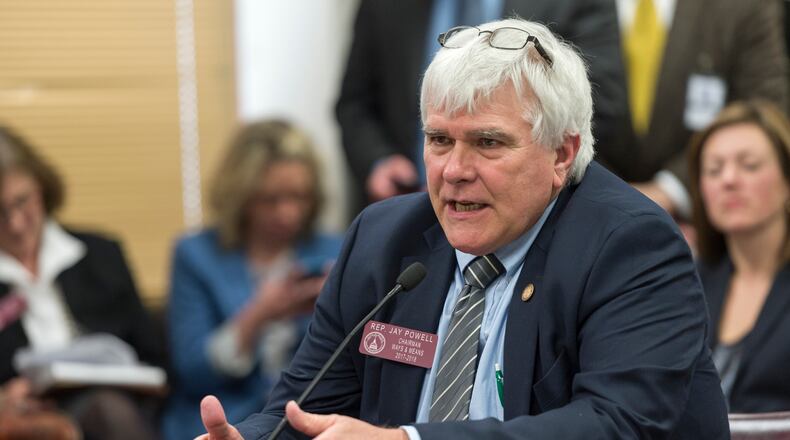A key Senate committee completed a two-day taxapalooza Wednesday by voting to cut the top state income tax rate, clarify that e-retailers must collect sales taxes for online purchases by Georgians, and eliminate sales taxes on taxi and limo rides.
The House had pushed to tax ride-share transportation from companies such as Uber, but the panel rejected the idea.
The moves came two days after the same group voted for legislation to cut taxes on people who lease cars, raise them on some Georgians who buy used cars, and increase tax credits available to individuals and companies that donate money to private school scholarship groups.
Starting Monday, the Senate Finance Committee began taking up many of the more than two-dozen tax bills the House sent it this year in hopes that at least some of them will get through the General Assembly by the time it quits for the year March 30.
Much of what they passed Monday and Wednesday may still change, and Senate Finance Chairman Chuck Hufstetler, R-Rome, made it clear that some of the changes Senate leaders made to tax-cut and tax-increase bills were negotiable. That all but guarantees backroom deals next week.
“There is going to be some more work on this,” Hufstetler said just before the panel approved the income-tax and e-retailers bill.
The Georgia House earlier approved House Bill 329 by House Ways and Means Chairman Jay Powell, R-Camilla, to drop the top income tax rate from 6 percent to 5.4 percent. Everybody would pay the same rate, but the bill created a low-income tax credit to make up for the elimination of lower rates paid by the poor.
The state currently has a graduated system, with rates starting at 1 percent and rising fairly quickly to 6 percent.
Critics said the bill would result in a tax increase for low-income, single Georgians, and that most of the benefit would go to Georgia's highest wage-earners.
Senators amended the bill to lower the top rate to 5.65 percent and increase the personal exemption Georgians can take by $300 per person. The graduated system would stay in place.
Under the Senate version, Hufstetler said, all Georgians would receive a tax cut. The savings to taxpayers, and cost to the state, would be about $200 million.
But the plan goes against the wishes of some conservatives who have long advocated income be taxed at a single, flat rate.
That was good news to some critics of the House plan.
“A big positive of the Senate version is that they moved away from the proposal for a flat tax,” said Wesley Tharpe, the research director of the left-leaning Budget and Policy Institute. “The House proposal for a flat tax raises taxes on the bottom (earners) and disrupted the long-term viability of Georgia’s revenue stream.”
The committee tacked onto the income tax bill House Bill 61 by Powell, which would force online retailers with at least $250,000 or 200 sales a year in Georgia to either collect and remit to the state sales taxes on purchases or send "tax due" notices each year to customers who spend at least $500 on their site.
Copies of the notices would go to the state Department of Revenue so it would know who owes at least some of the taxes.
“This is not a new tax, it is a mechanism to collect an existing tax,” Powell said. “The tax is already owed.”
Powell’s measure is the latest shot fired in a years-long battle to get online retailers to collect sales taxes on purchases. The owners of retail stores — who have a lot of political clout at the Capitol — have long said they are handicapped by the fact that their customers are charged state and local sales taxes on what they buy while many online customers are not. That means products can cost less when bought online.
The General Assembly passed a bill in 2012 aimed at getting Amazon.com to start collecting sales taxes, and in 2013 the company agreed to do so. Three years later it announced plans for a distribution center in Jackson County.
But many other e-retailers still don’t collect or remit the taxes to the state.
A state fiscal analysis suggests collecting those taxes could mean an extra $274 million in revenue for the state and $200 million for local governments. The combined figure could hit $621 million by 2022.
The committee also took up another bill by Powell, House Bill 225, which would make it clear that ride-share services such as Uber and Lyft should be charging a sales tax, just like taxis.
Supporters say the companies should already be collecting sales taxes under Georgia law.
Instead of passing Powell’s bill as it was written, the panel amended it to eliminate sales taxes on all transportation services, including taxis and limos.
Uber spokeswoman Evangeline George said companies instead would pay an annual fee.
“We thank the Senate Finance Committee for recognizing that Georgians should not be forced to pay more for Uber rides than residents of neighboring states,” she said in a statement.
Many of the bills won’t come before the Senate until next week, and final details will be worked out in the final hours of the session. So everything the committee did Monday and Wednesday on the tax bills could change.
"I think what we are trying to do is just move the ball forward," said state Sen. Rene Unterman, R-Buford, a member of the committee.
Legislative session coverage
The Atlanta Journal-Constitution has the largest team covering the Georgia Legislature. To see more of its legislative coverage, go to http://www.myajc.com/georgia-legislature/. To track particular bills and resolutions, check out the Georgia Legislative Navigator at http://legislativenavigator.myajc.com/. You can also follow the proceedings on Twitter at http://twitter.com/GAPoliticsNews or on Facebook at http://facebook.com/gapoliticsnewsnow.
Subscribe to our newsletter for more news about Georgia politics. Subscribe to politics news alerts in the AJC news app.
About the Author
Keep Reading
The Latest
Featured




